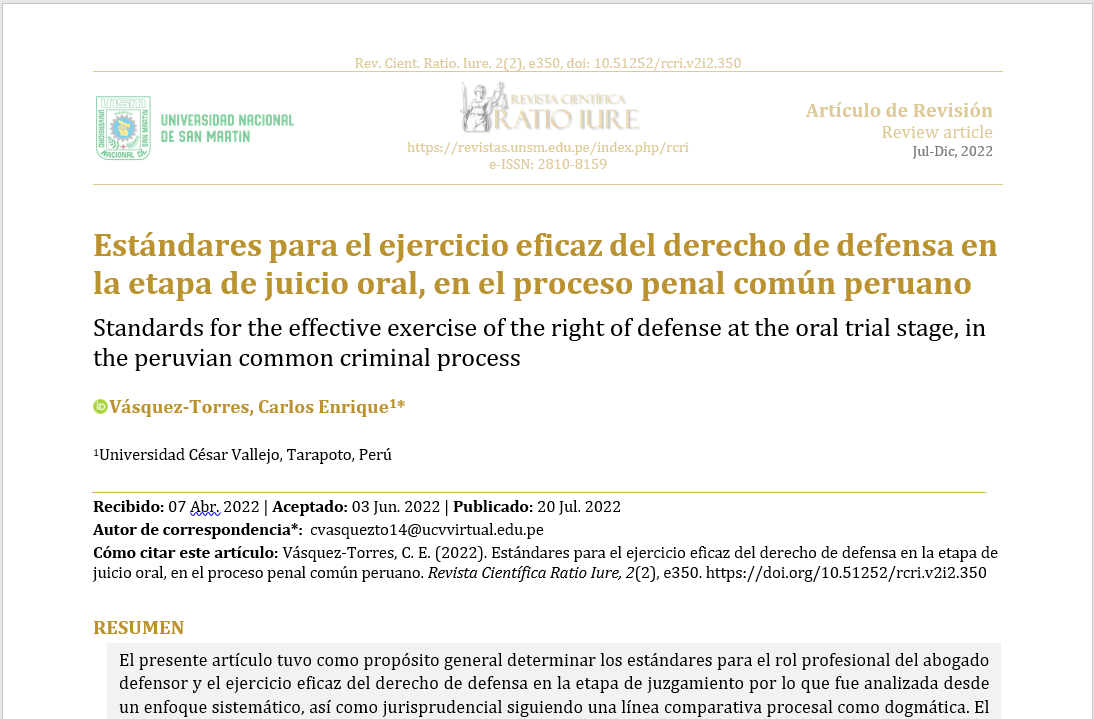Standards for the effective exercise of the right of defense at the oral trial stage, in the Peruvian common criminal process.
DOI:
https://doi.org/10.51252/rcri.v2i2.350Keywords:
procedural abandonment, defense attorney, fundamental rights, prosecution bodyAbstract
The general purpose of this article was to determine the standards for the professional role of the defense attorney and the effective exercise of the right of defense in the trial stage, for which it was analyzed from a systematic approach, as well as from a jurisprudential approach following a procedural comparative line as dogmatic. The type of research was a qualitative approach, so the method was analytical, of hermeneutic design where each of the bibliographic works that contributed to the development of this article was analyzed and interpreted. The results show that the internationally established standards place the lawyer in a procedural position in which the accused runs the risk of falling into defenselessness by not using an effective and concise criterion at the trial stage. In conclusion, the role of the lawyer is important in the exercise of the defendant's right to defense, identifying as the main standards of violation the failure to display a minimum evidentiary activity, insufficient argumentative activity, lack of legal technical knowledge of the criminal process, lack of interposition of appeals, improper substantiation of appeals and abandonment of the defense.
Downloads
References
Cito, D. (2020). El derecho de defensa en los procesos sobre delitos de abuso de menores. Ius Canonicum, 60(119), 61–88. https://doi.org/10.15581/016.119.009
García Pino, G., & Contreras Vásquez, P. (2013). El derecho a la tutela judicial y al debido proceso en la jurisprudencia del tribunal constitucional chileno. Estudios Constitucionales, 11(2). https://doi.org/10.4067/S0718-52002013000200007
Ghesquiere Briceño, M. F. (2010). El testigo sin rostro en Costa Rica [Universidad de Costa Rica]. http://repositorio.sibdi.ucr.ac.cr:8080/jspui/handle/123456789/4134
Hernández Aguirre, C. N. (2013). El derecho de defensa adecuada en el sistema penal acusatorio. Ciencia Jurídica, 2(4), 23–39. https://doi.org/10.15174/CJ.V2I2.37
Manrique, H. J. (2005). Los límites al derecho de impugnación en general y la apelación en particular: Una visión desde la perspectiva de la efectiva tutela jurisdiccional. Foro Jurídico, 4, 70–90. https://revistas.pucp.edu.pe/index.php/forojuridico/article/view/18379
Navarrete Martínez, J., & Arenas Valdés, R. H. (2020). Derecho de Defensa y el Debido Proceso en etapa intermedia. Dilemas Contemporáneos: Educación, Política y Valores, 7(Especial). https://doi.org/10.46377/DILEMAS.V7I.2384
Páez Cuba, L. D. (2020). La oralidad: su repercusión para la ciencia jurídica y la enseñanza del Derecho. Enunciación, 25(2), 206–219. https://doi.org/10.14483/22486798.16005
Rodríguez Chávez, R. (2021). Las audiencias virtuales análisis de sus ventajas y limitaciones en la práctica de pruebas testifical, pericial y la declaración del imputado. Sapientia & Iustitia, 3(2), 115–126. https://doi.org/10.35626/SAPIENTIA.3.2.20
Torres Morales de Ferreyros, S. A. (2008). ¿El derecho de defensa: una garantía que realmente se respeta? Revista Oficial Del Poder Judicial, 3(3), 253–268. https://doi.org/10.35292/ROPJ.V3I3.127
Normatividad:
Acuerdo Plenario N° 05-2008/CJ-116, Corte Suprema de Perú.
Constitución Política del Perú de 1993.
Ley 30838, Congreso de la República de Perú.
Ley Orgánica del Poder Judicial de Perú de 1993
Nuevo Código Procesal Peruano de 2004.
Jurisprudencia:
Corte Constitucional de Colombia, Sala Séptima de Revisión de tutelas, Sentencia T-395, 2010.
Corte Interamericana de Derechos Humanos. Caso Ruano Torres y Otros Vs El Salvador. Fondo, Reparaciones y Costas. Serie C No. 303, 2015.
Corte Suprema de Justicia de Guatemala. Cámara de Amparo y Antejuicio. Expediente 4469-2013, 2014.
Corte Suprema de Justicia de la Nación de Argentina. Indebida fundamentación de recursos impugnatorios. Fallo 333:1671, 2010.
Corte Suprema de Justicia de la República de Colombia, Sala de Casación Penal, Sentencia SP-3052, 2015.
Corte Suprema de Justicia de la República de Perú. Sala Penal Transitoria, Recurso de Nulidad No. 1432-2018, 2019.
Tribunal Constitucional de la República de Perú, Caso Asunta Quispe de Turpo, Expediente No. 5871-2005-PA/TC.
Tribunal Constitucional de la República de Perú, Caso César Joaquín Álvarez Aguilar. Expediente No. 6365-2013-PA/TC.
Tribunal Constitucional de la República de Perú, Caso Clen Natividad Apóstol representado por Juan Ponce Moreno. Expediente No. 1681-2019-PHC/TC
Tribunal Constitucional de la República de Perú, Caso Hernán Morante Trigozo. Expediente No. 5159-2011-PA/TC.
Tribunal Constitucional de la República de Perú, Caso Manuel Leoncio Pérez Paredes. Expediente No. 3694-2013-PA/TC.
Tribunal Constitucional de la República de Perú, Caso Manuel Rubén Moura García. Expediente No. 0549-2004-HC/TC.
Tribunal Constitucional de la República de Perú, Caso Margi Eveling Clavo Peralta. Expediente No. 1919-2006-PHC/TC.
Tribunal Constitucional de la República de Perú, Caso Ofronio Wilfredo Quequén Terrones. Expediente No. 5692-2014-PHC/TC.
Tribunal de Apelación de Sentencia Penal de San José de Costa Rica, Circuito Judicial, Sentencia 00323, 2014.

Published
How to Cite
Issue
Section
License
Copyright (c) 2022 Carlos Enrique Vásquez-Torres

This work is licensed under a Creative Commons Attribution 4.0 International License.
The authors retain their rights:
a. The authors retain their trademark and patent rights, as well as any process or procedure described in the article.
b. The authors retain the right to share, copy, distribute, execute and publicly communicate the article published in the Ratio Iure Scientific Journal (RCRI) (for example, place it in an institutional repository or publish it in a book), with an acknowledgment of its initial publication in the RCRI.
c. Authors retain the right to make a subsequent publication of their work, to use the article or any part of it (for example: a compilation of their works, notes for conferences, thesis, or for a book), provided that they indicate the source of publication (authors of the work, journal, volume, number and date).






